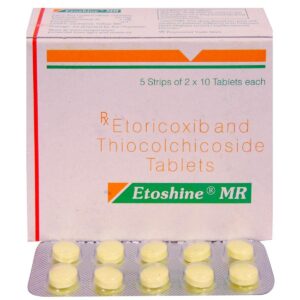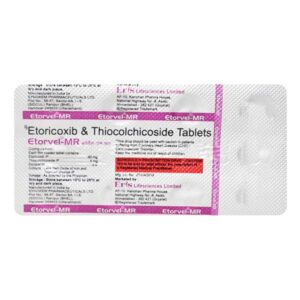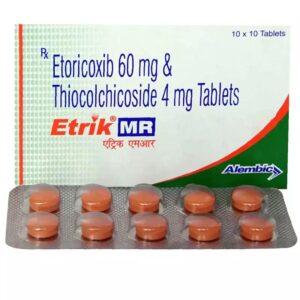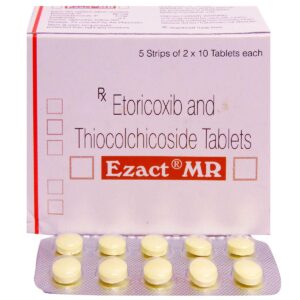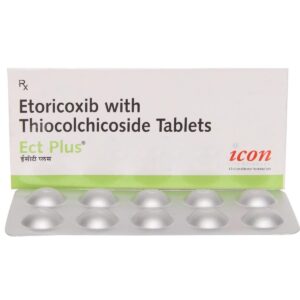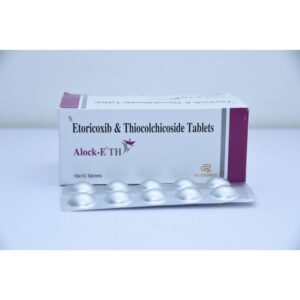ETORICOXIB + THIOCOLCHICOSIDE
Etoricoxib: Etoricoxib is a non-steroidal anti-inflammatory drug (NSAID) that is used to relieve pain and inflammation in conditions such as osteoarthritis, rheumatoid arthritis, ankylosing spondylitis, and gout.
The drug works by inhibiting the enzymes COX-2 (cyclooxygenase-2) and COX-1 (cyclooxygenase-1), which are responsible for producing prostaglandins. Prostaglandins are chemicals that contribute to pain and inflammation in the body. By blocking the production of these chemicals, etoricoxib can help reduce pain and inflammation in affected areas.
The recommended dose of etoricoxib varies depending on the condition being treated. For osteoarthritis and rheumatoid arthritis, the usual dose is 60 mg once daily. For ankylosing spondylitis, the recommended dose is usually 90 mg once daily. Gout may be treated with a dose of 120 mg once daily for a maximum of 8 days.
As with any medication, etoricoxib can have side effects. Common side effects include dizziness, headache, nausea, diarrhea, indigestion, and stomach pain. Less common but more serious side effects may include allergic reactions, liver problems, heart problems, and gastrointestinal bleeding. It is important to seek medical attention if any severe side effects occur.
Etoricoxib should not be used by individuals who are allergic to NSAIDs, have a history of allergic reactions to other medications, have a history of gastrointestinal bleeding or ulcers, or have severe heart, liver, or kidney problems. It should also be used with caution in individuals with a history of high blood pressure, heart failure, or stroke.
It is important to note that etoricoxib is a prescription medication and should only be used under the guidance and supervision of a healthcare professional. They can provide specific instructions and monitoring while taking etoricoxib to ensure its safe use and minimize the risk of side effects.
Thiocolchicoside: Thiocolchicoside is a medication that is commonly used as a muscle relaxant. It is primarily prescribed for the treatment of acute musculoskeletal pain and stiffness associated with conditions such as sprains, strains, and muscle spasms. It helps to relieve muscle tension and improve mobility.
The drug works by acting on the central nervous system and peripheral nerves to inhibit the transmission of pain signals. It binds to the gamma-aminobutyric acid (GABA) receptors in the brain, which enhances the inhibitory effects of GABA, a neurotransmitter that reduces neuronal excitability. This leads to muscle relaxation and pain relief.
The usual recommended dose of Thiocolchicoside is 8 to 16 mg per day, divided into 2-3 doses. It is available in tablet and topical gel forms. The dose may vary depending on the severity of the condition and the individual response to treatment. It is important to follow the dosage instructions provided by the healthcare professional.
Common side effects of Thiocolchicoside include dizziness, drowsiness, headache, nausea, and dry mouth. These side effects are usually mild and temporary. However, if you experience any severe or persistent side effects, it is important to consult your doctor.
Thiocolchicoside is contraindicated in individuals who have a known hypersensitivity or allergy to the drug. It should also be used with caution in patients with liver or kidney impairment, as the drug is primarily metabolized in the liver and excreted by the kidneys. It may interact with other medications, so it is crucial to inform your healthcare provider about all the medications you are taking.
Overall, Thiocolchicoside is a muscle relaxant commonly prescribed for acute musculoskeletal pain and stiffness. It works by inhibiting pain transmission in the central nervous system and peripheral nerves. It is essential to follow the recommended dose and consult a healthcare professional if you experience any concerning side effects.

